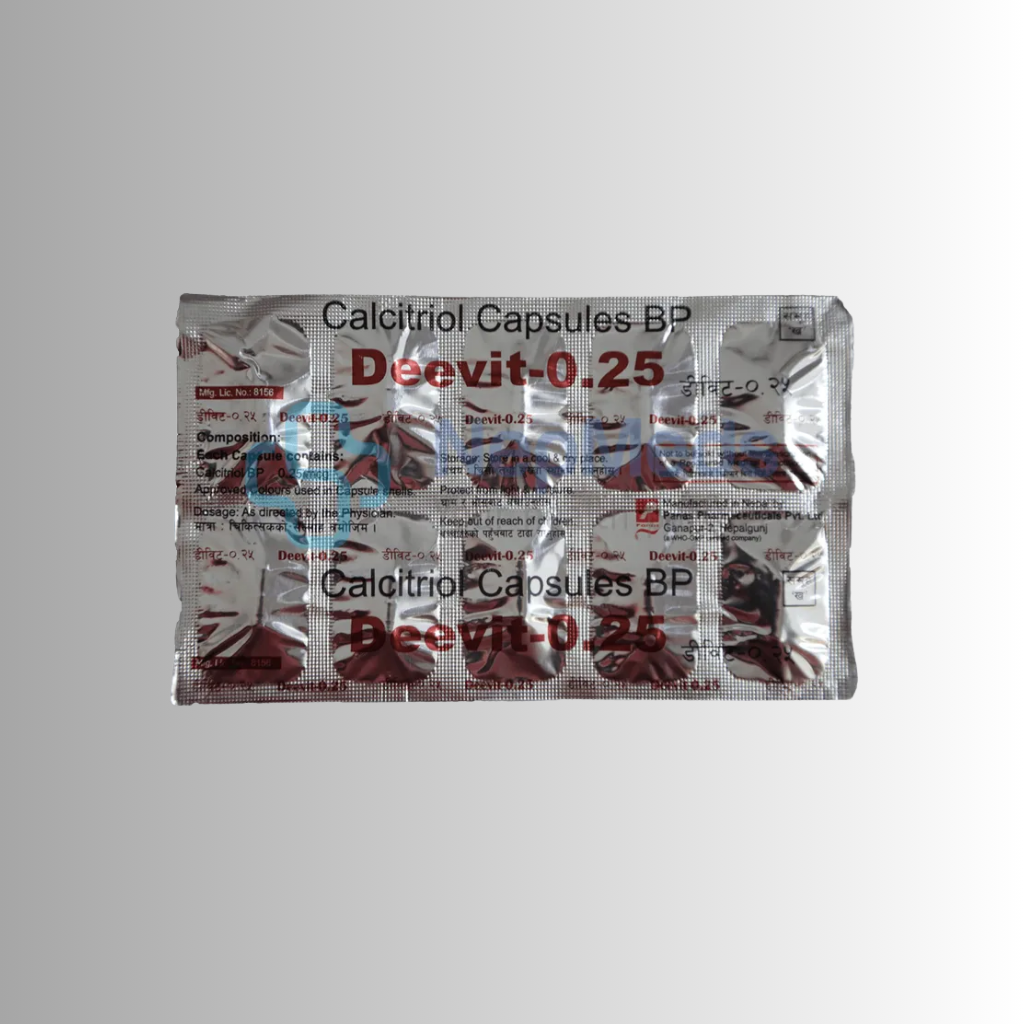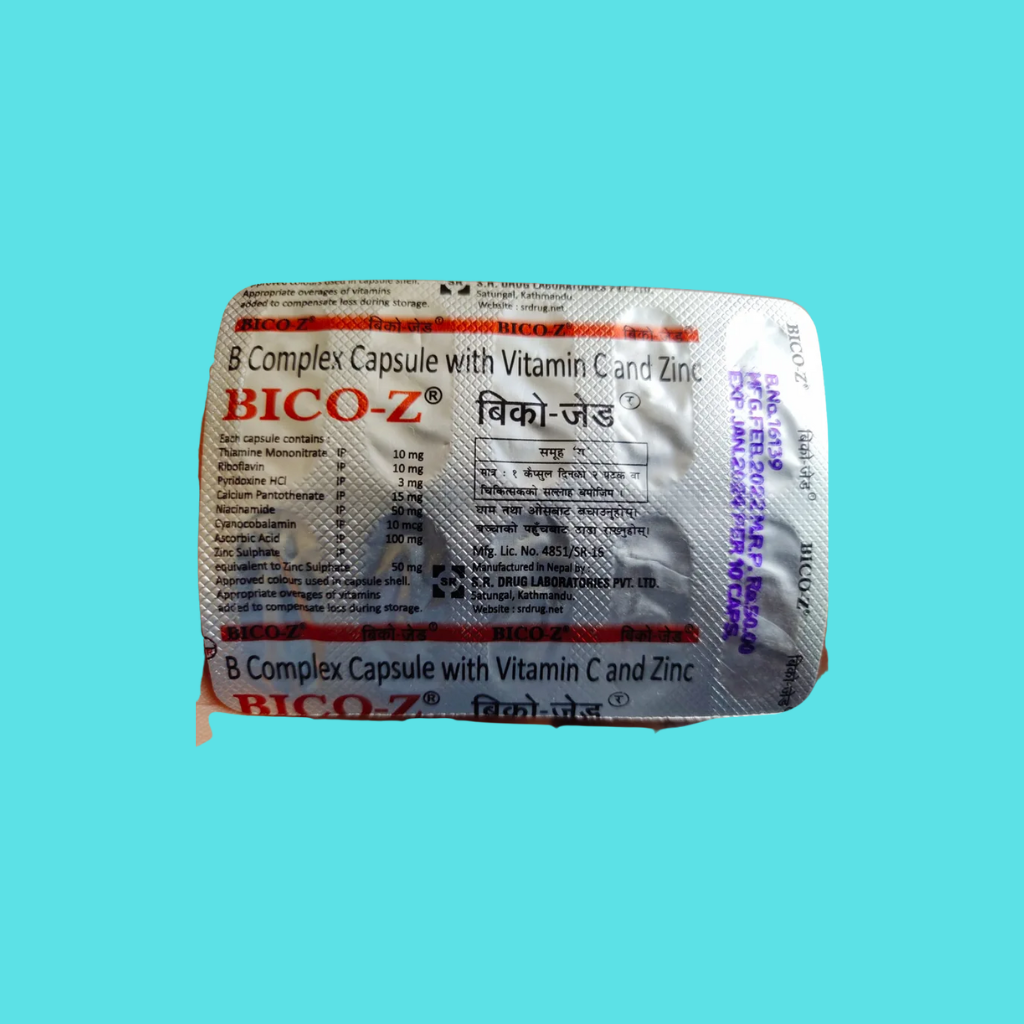Description
“Deevit 0.25mcg Cap” refers to a capsule containing 0.25 micrograms (mcg) of Calcitriol. This is a specific and potent form of Vitamin D.
Active Ingredient:
- Calcitriol BP – 0.25mcg: Calcitriol is the active form of Vitamin D3 (1,25-dihydroxycholecalciferol). Unlike regular Vitamin D supplements (like Cholecalciferol or D3), Calcitriol is already in its active form and does not require further conversion by the kidneys.
Mechanism of Action: Calcitriol is crucial for:
- Calcium Homeostasis: It plays a central role in maintaining calcium and phosphate balance in the body. It primarily acts by:
- Increasing the absorption of dietary calcium and phosphorus from the intestines.
- Regulating calcium and phosphorus levels in the blood.
- Promoting bone mineralization.
- Parathyroid Hormone (PTH) Regulation: It helps to suppress the secretion of parathyroid hormone (PTH), which can become excessively high in certain kidney conditions (secondary hyperparathyroidism). High PTH can lead to bone disease.
Key Uses: Deevit 0.25mcg Cap (Calcitriol) is primarily used in conditions where the body cannot effectively activate Vitamin D, often due to kidney problems. It is a prescription medication. Common uses include:
- Chronic Kidney Disease (CKD) with Low Calcium Levels:
- Secondary Hyperparathyroidism: A common complication of CKD where the parathyroid glands produce too much PTH, leading to bone problems and calcium/phosphate imbalances. Calcitriol helps to reduce PTH levels.
- Renal Osteodystrophy: Bone disease that occurs in patients with kidney failure due to mineral and hormone imbalances.
- Hypocalcemia (low calcium levels): In patients undergoing chronic renal dialysis or with moderate to severe CKD not yet on dialysis.
- Hypoparathyroidism and Pseudohypoparathyroidism: Conditions where the parathyroid glands do not produce enough PTH, leading to low calcium levels. Calcitriol bypasses the need for PTH-mediated activation.
- Vitamin D-Dependent Rickets and Hypophosphatemic Rickets: Rare genetic disorders where the body either cannot convert Vitamin D to its active form or has impaired phosphate reabsorption, respectively.
- Osteoporosis (sometimes, as part of a regimen): Though less common as a primary treatment than for kidney-related bone disease, it may be used in some complex cases of osteoporosis.
Side Effects
The most significant side effect of Calcitriol is hypercalcemia (abnormally high calcium levels in the blood) and hyperphosphatemia (high phosphate levels), which can be dangerous. Careful monitoring of blood calcium and phosphate levels is essential during treatment.
Early Symptoms of Hypercalcemia (mild toxicity):
- Weakness, fatigue, drowsiness
- Headache
- Nausea, vomiting, dry mouth, metallic taste in mouth
- Loss of appetite
- Constipation
- Muscle pain, bone pain
Late Symptoms of Hypercalcemia (severe toxicity):
- Polyuria (frequent urination), polydipsia (increased thirst)
- Dehydration
- Weight loss
- Irregular heartbeat (arrhythmia)
- Changes in vision
- Psychosis
- Pancreatitis (inflammation of the pancreas)
- Nephrocalcinosis (calcium deposits in the kidneys), leading to kidney damage and failure.
Other Potential Side Effects:
- Allergic reactions: Rash, itching, hives, swelling (rare).
- Urinary tract infection (less common)
- Sleep disturbances (insomnia)
If you experience any of these symptoms, especially those of hypercalcemia, contact your doctor immediately.
Precautions
Deevit 0.25mcg Cap is a potent medication and requires careful medical supervision.
- Hypercalcemia/Vitamin D Toxicity: This medication is contraindicated if you already have high calcium levels in your blood or evidence of Vitamin D toxicity. Your doctor will monitor your blood calcium and phosphate levels frequently.
- Strict Dietary Adherence: You will likely need to follow a special diet, especially regarding calcium and phosphate intake, as advised by your doctor. Uncontrolled intake of calcium-containing foods or supplements can lead to hypercalcemia.
- Kidney Disease: While used for kidney disease, careful monitoring is critical. Your doctor will assess kidney function regularly.
- Concomitant Medications: Inform your doctor about ALL other medications, supplements, and herbal products you are taking.
- Other Vitamin D Preparations: Do NOT take any other Vitamin D supplements (including regular Vitamin D3 like D-up or Deevit 60K) or derivatives while on Calcitriol, as this can lead to severe toxicity.
- Calcium or Phosphate Supplements: Use caution, and take only as directed by your doctor, as co-administration can increase blood calcium/phosphate levels.
- Thiazide Diuretics (water pills): Can increase the risk of hypercalcemia.
- Magnesium-containing Antacids (e.g., Milk of Magnesia, Mylanta): Should be avoided in patients with chronic renal dialysis, as Calcitriol can increase magnesium absorption, leading to hypermagnesemia.
- Digitalis/Digoxin (heart medications): High calcium levels (due to Calcitriol) can increase the risk of cardiac arrhythmias and digitalis toxicity.
- Corticosteroids: Can counteract the effects of Calcitriol by decreasing calcium absorption.
- Certain Anticonvulsants (e.g., Phenytoin, Barbiturates): Can increase Calcitriol metabolism, potentially reducing its effectiveness.
- Pregnancy and Breastfeeding: Use with caution during pregnancy if the benefits outweigh the risks. Calcitriol can pass into breast milk; it is generally not recommended during breastfeeding due to the potential for hypercalcemia in the infant. Discuss thoroughly with your doctor.
- Granulomatous Diseases (e.g., Sarcoidosis): Patients with these conditions may be more sensitive to Vitamin D and prone to hypercalcemia.
- Dehydration: Patients with normal renal function taking Calcitriol should avoid dehydration.
- Monitoring: Regular blood tests (serum calcium, phosphate, PTH, alkaline phosphatase, creatinine) are essential during treatment.
- Symptoms Awareness: Patients and their families should be educated on the symptoms of hypercalcemia and advised to report them immediately.
Prescription Information
- Availability: Deevit 0.25mcg Cap is a prescription-only medication in Nepal and most other countries. It should never be self-prescribed.
- Dosage: The dosage of Calcitriol is highly individualized and depends on the specific condition being treated, the patient’s blood calcium and PTH levels, and their response to therapy.
- Initial doses are typically low (e.g., 0.25mcg daily or every other day) and are gradually increased based on regular blood test results.
- For patients on dialysis: Initial dose is often 0.25mcg daily or every other day, with subsequent adjustments.
- For predialysis patients (moderate to severe CKD): Initial dose typically 0.25mcg daily.
- For hypoparathyroidism: Initial dose often 0.25mcg daily.
- Administration:
- Take the capsule by mouth with a glass of water, usually once daily, often in the morning, with or without food.
- Swallow the capsule whole; do not crush or chew.
- Consistency: Take the medication at the same time each day to maintain consistent blood levels.
- Missed Dose: If you miss a dose, take it as soon as you remember unless it’s almost time for your next dose. In that case, skip the missed dose and continue with your regular schedule. Do not take a double dose.
- Overdose: An overdose of Calcitriol is serious and can lead to dangerously high calcium levels. Seek immediate medical attention or contact a poison control center if an overdose is suspected.
- Storage: Store at room temperature (typically below 25°C or as per manufacturer’s instructions), away from light, moisture, and heat. Keep out of reach of children.
Additional information
| form | Oral Tablets |
|---|








Reviews
There are no reviews yet.